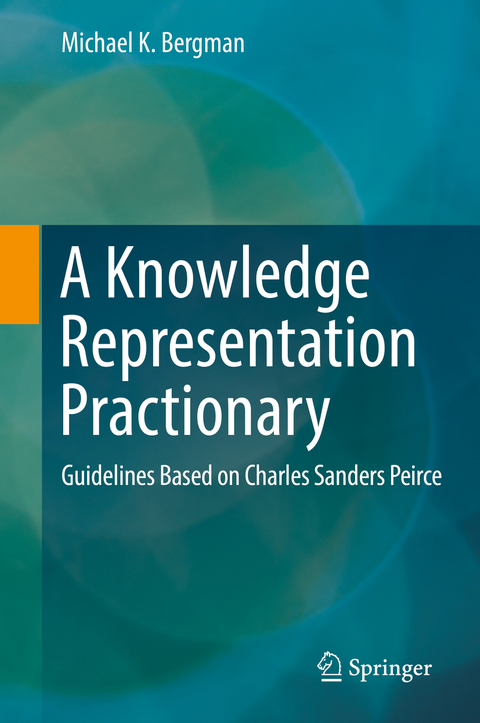
A Knowledge Representation Practionary
Springer International Publishing (Verlag)
978-3-319-98091-1 (ISBN)
This major work on knowledge representation is based on the writings of Charles S. Peirce, a logician, scientist, and philosopher of the first rank at the beginning of the 20th century. This book follows Peirce's practical guidelines and universal categories in a structured approach to knowledge representation that captures differences in events, entities, relations, attributes, types, and concepts. Besides the ability to capture meaning and context, the Peircean approach is also well-suited to machine learning and knowledge-based artificial intelligence. Peirce is a founder of pragmatism, the uniquely American philosophy.
Knowledge representation is shorthand for how to represent human symbolic information and knowledge to computers to solve complex questions. KR applications range from semantic technologies and knowledge management and machine learning to information integration, data interoperability, and natural language understanding. Knowledge representation is an essential foundation for knowledge-based AI.
This book is structured into five parts. The first and last parts are bookends that first set the context and background and conclude with practical applications. The three main parts that are the meat of the approach first address the terminologies and grammar of knowledge representation, then building blocks for KR systems, and then design, build, test, and best practices in putting a system together. Throughout, the book refers to and leverages the open source KBpedia knowledge graph and its public knowledge bases, including Wikipedia and Wikidata. KBpedia is a ready baseline for users to bridge from and expand for their own domain needs and applications. It is built from the ground up to reflect Peircean principles.
This book is one of timeless, practical guidelines for how to think about KR and to design knowledge management (KM) systems. The book is grounded bedrock for enterprise information and knowledge managers who are contemplating a new knowledge initiative.
This book is an essential addition to theory and practice for KR and semantic technology and AI researchers and practitioners, who will benefit from Peirce's profound understanding of meaning and context.
Michael K. Bergman is a senior principal for Cognonto Corporation, and lead editor for the open-source KBpedia knowledge structure. For more than a decade, his AI3:::Adaptive Information blog has been a leading go-to resource on topics in semantic technologies, large-scale knowledge bases for machine learning, data interoperability, knowledge graphs and mapping, and fact and entity extraction and tagging. For the past twenty years Mike has been an entrepreneur, Web scientist, and independent consultant. For the decade up to 2018, Mike was the CEO of Structured Dynamics LLC, which he co-founded with Fred Giasson. Mike has held C-class positions and was a founder of the prior companies Zitgist LLC, BrightPlanet Corporation, VisualMetrics Corporation, and TheWebTools Company. These companies provided notable market advances in semantic technologies, data warehousing, the deep Web, large-scale Internet databases, meta-search tools, and bioinformatics. Bergman began his professional career in the mid-1970s as a project director for the U.S. EPA for a major energy study called the Coal Technology Assessment. He later taught in the Graduate School of Engineering at the University of Virginia, where he was a fellow in the Energy Policies Study Center. He then joined the American Public Power Association in 1982, where he rose to director of energy research. APPA's pioneering work with small computers sparked Bergman's transition to information technologies. Before entering industry, Mike was a doctoral candidate at Duke University in population genetics.
1 Introduction.- 2 Information, Knowledge, Representation.- 3 The Situation.- 4 The Opportunity.- 5 The Precepts.- 6 The Universal Categories.- 7 A KR Terminology.- 8 KR Vocabulary and Languages.- 9 Keeping the Design Open.- 10 Modular, Expandable Typologies.- 11 Knowledge Graphs and Bases.- 12 Platforms and Knowledge Management.- 13 Building Out the System.- 14 Testing Best Practices.- 15 Potential Uses in Breadth.- 16 Potential Uses in Depth.- 17 Conclusion.
| Erscheinungsdatum | 12.10.2018 |
|---|---|
| Zusatzinfo | XVII, 462 p. 28 illus., 16 illus. in color. |
| Verlagsort | Cham |
| Sprache | englisch |
| Maße | 155 x 235 mm |
| Gewicht | 877 g |
| Themenwelt | Mathematik / Informatik ► Informatik ► Netzwerke |
| Informatik ► Theorie / Studium ► Künstliche Intelligenz / Robotik | |
| Mathematik / Informatik ► Mathematik ► Finanz- / Wirtschaftsmathematik | |
| Schlagworte | Artificial Intelligence • Charles Sanders Peirce • data interoperability • KBpedia • knowledge base • knowledge-based artificial intelligence • Knowledge graph • knowledge management • Knowledge Representation • Ontology • OWL • RDF • semantic technologies • semantic web |
| ISBN-10 | 3-319-98091-2 / 3319980912 |
| ISBN-13 | 978-3-319-98091-1 / 9783319980911 |
| Zustand | Neuware |
| Informationen gemäß Produktsicherheitsverordnung (GPSR) | |
| Haben Sie eine Frage zum Produkt? |
aus dem Bereich


